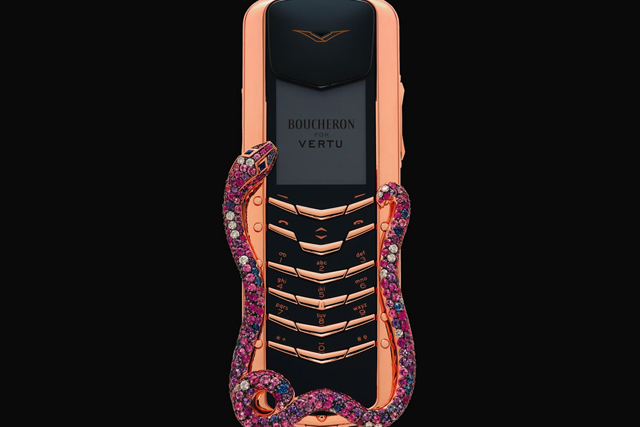Vertu made its name more than a decade ago by producing mobile handsets encrusted with precious stones and providing a personal concierge service for its users, accessed at the touch of a button.
Launched in 1998, it is a UK-based subsidiary of handset manufacturer Nokia. Its phones are made by hand, with crystal displays and sapphire keys going some way toward justifying the hefty £4000 average price per handset.
The brand has relied on exclusivity to push sales, with partnerships with big names such as Ferrari, and users can also access ringtones written by popular bands. Widely coveted and endorsed by several celebrities, Vertu has established itself as the dominant player in the luxury smartphone arena.
However, it has been increasingly criticised for using outdated technology; it runs on Nokia's Symbian operating system - which is being phased out in favour of Windows Phone 7 - and launched its first smartphone, the Constellation, only last year. Last month, Nokia revealed that talks to sell its Vertu subsidiary to a private-equity group were at an advanced stage.
While the sale seems a logical move for Nokia, which posted substantial losses for the first quarter of this year, where does this leave Vertu, and what does the future hold for its technology development?
We asked former Bentley Motors marketing and communications director Andrew Watt, now a director at consultancy One Big Step, and Toby Gunton, chief digital officer at agency WCRS, which formerly handled the Vertu account.
VERTU: THE FIGURES
300,000 - The number of units sold since 2002
120 - branded stores in 70 countries
Source: Vertu
ANDREW WATT, Consultant, One Big Step (and former marketing and communications director at Bentley Motors)
Vertu took its inspiration from the watch industry, with minimalist designs and quality components. Marketing, packaging and buying experience were carefully considered.
Handsets were sold without contracts in Vertu-branded retailers and jewellers, and delivered in lavish boxes, with additional services including concierge and craftsman servicing. Its desirability was visual and tactile, the price justified by individuality.
Vertu has become a credible global luxury brand and has a unique market position. By ignoring traditional phone retailing and maintaining long model cycles, comparison-shopping has been reduced and Vertu has created its own mythology, much like audiovisual brand Bang & Olufsen in the past.
However, the market is shifting. Convergence is key and the iPhone is king. Even luxury consumers ignore size and call-quality in favour of features and function. Text has replaced voice and consumers expect annual upgrades.
REMEDY
- As an independent, it is crucial to find an innovation-led approach to technology partnership. It is vital that new products include must-have functionality, fully integrated.
- Vertu must maintain product integrity, but could investigate the untapped market below its current range for a higher-volume premium handset.
- The brand should consolidate its premium position in emerging markets. It could consider broadening its member services concept through brand partnerships.
TOBY GUNTON - Chief digital officer, WCRS (which formerly worked on the Vertu account)
When Vertu launched in 1998 it was a bit of a laughing stock. Why would anyone pay thousands of pounds for out-of-date Nokia mobile technology wrapped in carbon-fibre and gold?
It's a question that is probably even more valid today. Yet, somehow, Vertu has established a new category over the past 14 years, complete with pretenders and dodgy online fakes.
Yet it has been held back by the one thing its owner, Nokia, should have provided: technology. The Symbian OS Vertu used may have been 'tweaked', but it hardly rivals iOS.
However, I've been fortunate enough to meet Frank Nuovo, Vertu's chief designer, and his passion is contagious. I've also seen Vertu handsets being painstakingly hand-crafted. Both experiences were eye-opening and demonstrated that Vertu has the culture and excellence to rival some of the great luxury brands. Nokia unloading Vertu may be the best thing that has happened to the brand.
REMEDY
- Make sure the product has technical parity. It doesn't need to be better than Apple, HTC, BlackBerry et al, but it does need to be as good.
- Reinforce the total luxury customer experience. Owning a Vertu is going to be compared with owning a RollsRoyce, so it needs to feel like it. A concierge service for people who can afford a Vertu isn't the answer.
- Create a fresh language. Vertu communication has slavishly borrowed from the established language; it has built luxury by association. It's time to step out of the shadows.


